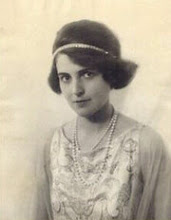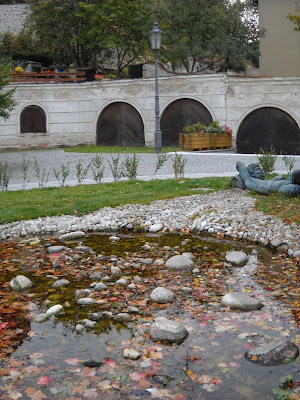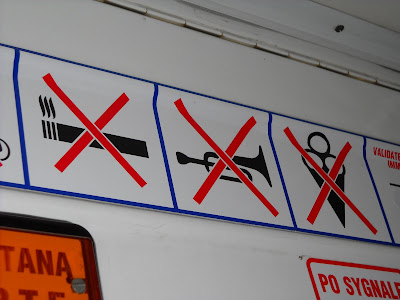 a man with a bird of prey on the castle grounds! roaaaaaar.
a man with a bird of prey on the castle grounds! roaaaaaar.Well, hello, my loving and devoted public (hi parents!)... I am back from Budapest (although, in what may be the worst decision ever, I didn't buy a T-Shirt with a mock Back to the Future logo that said BACK TO BUDAPEST) and I had a really unexpectedly fabulous time. This picture post is mainly synagogues, but they're quite nice. It seems most of my blog posts are about life outside Prague, which is mainly because Prague has become so much my home that it seems bizarre to take photographs.
It was a dark and stormy afternoon:
 castle on a hill. the "buda" part of budapest.
castle on a hill. the "buda" part of budapest.We were armed with just our transport passes, how to say "Cheers" in Hungarian, and an arsenal of Jewish historical knowledge.
 I don't know what this statue from the metro station means, but it makes me so happy.
I don't know what this statue from the metro station means, but it makes me so happy.We explored some really kickass synagogues...
 A fantastically ornate synagogue. I sort of want to live there.
A fantastically ornate synagogue. I sort of want to live there. Inside the second largest synagogue in the world.
Inside the second largest synagogue in the world. The barren remains of another synagogue, now with a half-made memorial and rubble on the ground. This was one of the most affecting parts of the trip, to see this place, which once housed a dozen Torahs, completely ruined, with no one to care about it. It was a stark contrast to the tourist hubs and gorgeous sanctuaries of the other synagogues, an emptiness that was a testament to violence and hatred.
The barren remains of another synagogue, now with a half-made memorial and rubble on the ground. This was one of the most affecting parts of the trip, to see this place, which once housed a dozen Torahs, completely ruined, with no one to care about it. It was a stark contrast to the tourist hubs and gorgeous sanctuaries of the other synagogues, an emptiness that was a testament to violence and hatred. more ornate Hungarian synagogue
more ornate Hungarian synagogue
more synagogue in desolate disrepair

outside of the 2nd largest synagogue in the world (the first is in New York)
I spent most of the trip exploring the streets, seeing the sights, and, notably, spending 3 hours in a cafe with my friends, drinking fresh fruit tea (liberated from teabags!) and chatting with the kind waitress. Budapest was very diverse, alternative, and hip -- we also went to a bar for a classmate's birthday, and it was a renovated apartment building, with strange found objects and labyrinthine rooms with music and lights and a mix of different languages blending together, finding commonality, enjoying difference.
I had the best time at the Judafest, a Jewish festival on Sunday, full of delicious Jewish food (I ate amazing falafel many times over the course of the trip!) and music and dance and crafts. There were adorable Jewish children running around everywhere, and it filled my heart with hope. After going to so many cities which spoke about the former glory of the Jewish people, and related tale after tale of destruction, it was nice to see a place where the Jewish community was thriving and growing and living. Hungary is by no means perfect, and anti-Semitism is alarmingly common, but on Sunday, there was a celebration of Jewish life and renewal. I talked to a theatre company producing the works of a fantastic Israeli playwright (Etgar Keret) in Hungarian, bought some Judaica jewelry, and enjoyed the company of my culture.
I am one month away from returning to America, and I hope to have more exciting adventures, but being at the Judafest was a welcome bit of comfort in what can be a lonely road. It's a bit hackneyed, maybe, but whenever I find a happy, singing Jewish community, full of food and people and laughter, I feel like I'm home.










































